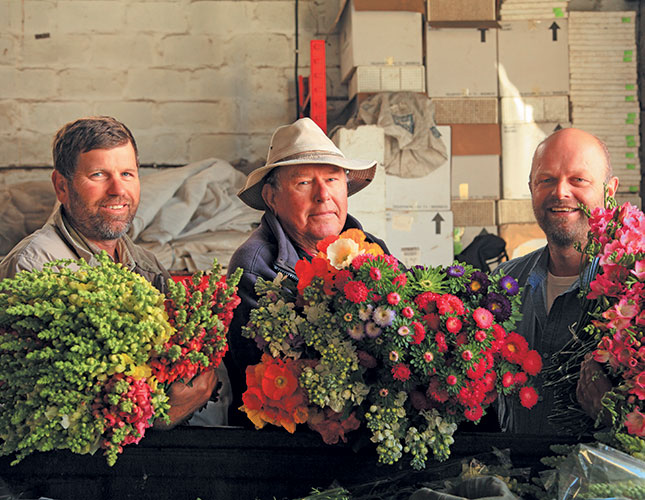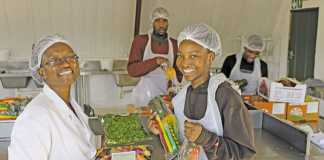
Making it in the flower industry is not easy. As with most agricultural commodities, prices are volatile and competition is stiff.
Engelke Blomme, a flower producer established in the 1930s in Philippi in the Western Cape, has overcome these challenges and expanded from a small, part-time business to a major regional operation.
Günther Engelke, one of the company’s directors, attributes the success of the enterprise to following conventional business practices.
According to him, one of the first tasks before launching a flower production business – or any farming business – is to develop a sound business strategy.
“It doesn’t help to have the most suitable production environment in the world, but your produce isn’t profitable. You therefore need a good estimate of all your input costs and income before embarking on such a venture,” he says.
Choosing a market
Market choice is crucial for a farming operation’s success, as produce can be sold in various ways, from informal traders and the fresh market to retail stores.
Engelke Blomme has its own market on the Old Strandfontein Road on the Cape Flats. About 50% of its flowers are sold wholesale, while 20% are sold to florists and 30% to private vendors.
Günther says that the greatest advantage of having their own market is the independence and freedom it brings.
“While producers are often flooded with all kinds of regulations to be allowed to supply a retailer, having your own market means that you can focus more energy on things that are important to you, like the production of good-quality flowers.”
He adds that supplying a retailer does have some advantages, as farmers do not have to actively market their produce.
“If you want to supply a retailer directly, you have to make peace with the fact that you will be a price taker, and that there will be all kinds of quality control measures to which your produce and production processes will have to conform. Don’t waste your energy fighting and complaining about this, as that is the nature of this type of market. On the plus side, your market risks might be lower than if you sold the flowers yourself.”
Planning production around events
Production must be planned strategically to coincide with big market days, which traditionally include Christmas, Mother’s Day, Easter, Valentine’s Day and Eid al Fitr. According to Günther, it is, however, important to produce a continuous supply throughout the year.
To ensure this, Engelke Blomme produces 40 different varieties of flowers and new seeds, while bulbs and plants are propagated regularly. The varieties are guided by market demand and suitability to the farm’s production conditions.
“We cannot produce everything, so some of our products, such as roses, are sourced from other growers,” he says.
Tunnel production
Twenty years ago, Engelke Blomme began producing flowers in tunnels for wind protection. Currently, flowers are produced in 3,5ha of tunnels, and on 6,5ha of open lands.
“We’ve suffered huge losses due to wind damage over the years. Recently, we suffered R50 000 worth of damage to our sunflowers,” Günther says.
The tunnel frames are made of hot-dipped, galvanised steel, covered with plastic, and white shade nets.
“We’re close to the sea, so we need galvanised steel to prevent rust. Infrastructure won’t last five years here if it’s not galvanised.”
He warns farmers to buy good-quality, albeit more expensive, tunnel infrastructure, as buying cheaply could result in greater expenditure, a lesson the Engelkes learnt when their new, cheaper structure broke shortly after installation.
Overhead shade net is used during summer to protect certain flower varieties from sunburn and encourage better length growth. White nets are used as windbreaks as they provide less shade.
Günther says that enclosing the tunnel with plastic all round would require a climate control system to manage temperatures and humidity inside the tunnels.
“This would triple the cost of the structure, and result in a monthly running cost,” he says. “You’d have to sell lots of flowers to justify such a capital investment. You have to make the structure work for you, not the other way around.
“We don’t have any fancy temperature control systems. The arches on the sides of the roof are covered by shade-net, which keep temperatures moderate; the sides of the tunnels can be opened manually if needed. We also use black material curtains to manipulate tunnel light.”
Soil, and Pest and weed control
As soil is the cheapest growth medium, Engelke Blomme plants its flowers directly into soil.
While crop rotation is used to prevent the build-up of soil pathogens, the soil is also occasionally fumigated. Günther says that methyl-bromide was particularly effective, but that its use is no longer permitted. While Engelke Blomme is experimenting with other products to find a suitable replacement, nothing has so far proven as effective.
Weeds are particularly problematic, and Günther advises farmers to experiment with various products to identify those that work best. He warns, however, that these should be rotated according to their active ingredients to prevent weeds developing resistance.
Plants should also be regularly scouted for pests and diseases, and Engelke Blomme employs workers trained to identify pests. Günther, Otto (his father) and Volkmar (his brother) keep an eye out too.
“The wind blew the roof off one of our structures a year ago, resulting in our lisianthus plants contracting false mildew. The disease spread like wildfire, and caused a loss of R200 000 in just three days,” he recalls.
To reduce input costs and protect the business from the vulnerability of the seed and bulb market, the Engelkes harvest and save seed and bulbs to be reused for another production cycle. However, this method does not apply to all seed and bulbs, as many cultivars are protected by breeders’ rights and cannot be grown from one’s own seed.
A labour-intensive industry
Günther emphasises that flower farming is hard work.
“Flowers are a high-value crop that requires very intensive management. You cannot be away from the farm for long periods. We pick flowers throughout the year, but close down over the weekends. Regardless of that, my brother, father and I still have to take turns to work at our market on Saturdays.”
Flower production is also extremely labour-intensive, and the Engelkes employ between 40 and 50 labourers per day. Labourers are part-time or permanent, depending on the season.
Phone Günther Engelke on 021 703 3389.
Issue date: 23 September 2016












